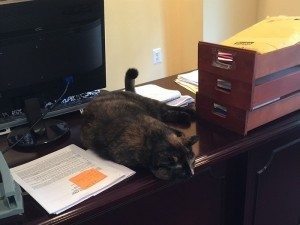 Dear Angel,
Dear Angel,
My son was recently diagnosed with autism spectrum disorder (ASD) and I understand that April is Autism Acceptance Month. I don’t know much about ASD. Is there anything you can share to help my family.
Thanks!
Dawn Nomuch
—
Dear Dawn,
About one in 36 children have autism spectrum disorder (ASD), the Centers for Disease Control and Prevention states. And, as you mentioned, the month of April is Autism Acceptance Month! In honor of this month, I will bring you some insights from someone who knows a lot about what it is like to live with ASD, Temple Grandin.
In a recent interview, animal behaviorist Temple Grandin (who has ASD) explains what helped her become successful and how parents can help their own autistic children. Grandin is a scientist, author, and professor of animal science at Colorado State University, who has transformed the meat industry through her design of more humane handling systems for livestock.
These are some of the life experiences and tips Grandin shares for parents of children with ASD:
- Growing up, her mother was always encouraging her ability in art and pushing her to do new things. She had a very good sense of what her daughter would and would not be able to handle.
- Her mother took Temple’s fixated interest (e.g. drawing horse heads) and expanded it to her drawing the entire stable. It’s very important to try to expand your child’s existing interests.
- Social skills were taught in a much more structured way in her generation. “When kids were seven or eight, they had to put on their good clothes and (when the parents had a party) greet the guests, pass out the snacks, learn how to talk to the guests. In her generation, adults would give the instruction on what you were supposed to do.
- According to Grandin, “(i)f you have a two year old that’s not talking, regardless of cause (as long as there’s not deafness or something wrong with the mouth), you need to get into therapy right away. And if you’re in a situation where you can’t get one-on-one therapy, then get grandmothers in the neighborhood to work with the kid.” She recommends the following:
- “Teach them language. Teach them how to take turns at games, and teach them skills, like putting on clothing. The worst thing you can do with a child that’s not talking at age two and three is do nothing and let them zone out on electronics.”
- “When the kids get a little older, we need to be looking more at what they can do. A lot of those that remain non-verbal have more skills than you think they might have. Build on the thing the kid is good at.”
- “Kids have to be exposed to things to find out what they might be good at. I feel so strongly that schools made a big mistake when they took out all the hands-on classes, because I was super good at art. Well, that’s not gonna show up if art is never encouraged. For another kid, it might be music.”
- “And work on what they’re good at. I’m very much into career. Students get interested in what they get exposed to. I got interested in the cattle industry because I was exposed to it as a teenager. I just watched that movie, The Fabelmans, that’s about Steven Spielberg’s childhood. He had a movie camera when he was 12 years old and filmed a train wreck with toy trains. He was exposed to movie cameras very young and got to use them.”
Grandin describes herself as an extreme visual thinker, and she believes that has helped her in her work with animals. According to Grandin, “(a)nimals live in a sensory-based world. It helped me in my design work because the visual thinkers like me see the world in photorealistic pictures.” She says that the kinds of jobs that her kind of mind is good at are art, animal behavior, mechanical devices, and photography. She claims that she “absolutely can’t do algebra; because it’s too abstract.”
She urges everyone to find something that they can be good at, that they can turn into a satisfying career. She said, “(y)ou might have an autistic kid where math’s going to be their thing, they’re going to be doing computer programming; and then you have the word thinker that knows every fact about baseball statistics. That’s one of the things that has made life worthwhile for me.”
You can read more about Temple Grandin in Mr. Farr’s article about her.
Hope this is helpful!
Angel
















Leave a comment
You must be logged in to post a comment.